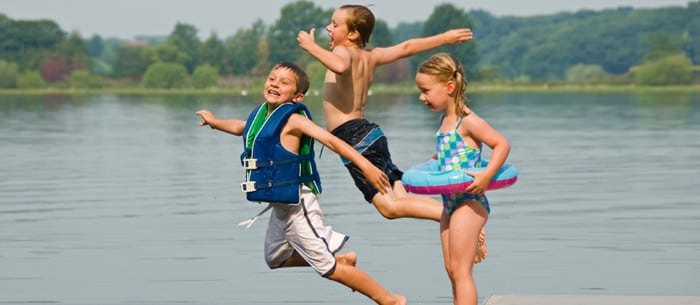When it came time to choose a day camp for my daughter Ella last summer, I was overwhelmed. She was about to enter kindergarten, and had outgrown her preschool camp. There was a seemingly endless array of possibilities — and like most big decisions, none were completely perfect. Should I send her to town camp, where she’d meet other kids she’d go to school with? Or should I choose a full-day program that would include twice daily swim periods? And would my daughter do better at the art camp that her best friend was going to, or would she be better off at a camp that exposed her to more sports?
Talking to other parents, I learned I wasn’t alone in my confusion. With over 12,000 day and sleep-away camps nationally, ranging from $100 to over $800 a week, there’s a lot to choose from. And the primary reason for picking a camp is as varied at the camps themselves. When it comes to choosing a day camp, where your children’s friends attend is often the key deciding factor, says Laurel Barrie, co-owner of Camp Connection, a consultancy agency that helps parents pick a camp for their child. (The service is free to parents, with chosen camps paying a set fee to the company.) “Most people feel that their child will be happy as long as he or she is with school friends,” she explains. “Others prioritize price or hours of operation.”
Town Camps
Town camp is the most budget-friendly option, but as one mom says, “you get what you pay for and you don’t pay much.” Usually, these camps meet at town pools, fields or schools, and are staffed by local teenagers. One mom chose town camp because she wanted her five-year-old son to become comfortable in the elementary school before starting there in the fall, as well as meet other children who would also be attending kindergarten.
Town camp is a top pick among parents who travel a lot as well. “Since it’s so inexpensive, I don’t mind my sons missing it if we decide to go away for a long weekend,” says one stay-at-home mom from New York. Often, town camps offer half-day programs for younger kids, with full-day starting around second or third grade. Since facilities are limited, older children tend to go on lots of field trips to nearby zoos or amusement parks.
Specialty Camps
Another option for parents is specialty “camps” at local companies that offer classes in everything from ice skating to horseback riding. “My daughter absolutely loves both ballet class and gymnastics, so we broke up the summer with three weeks at each type of camp,” explains one mother. “The classes run from nine until noon, and then we would spend our afternoons at the local pool.” One father chose to enroll his daughter in farm camp, where she’d spend her days doing farm chores like egg gathering along with other crafts and activities. “I wanted her to spend her summer doing something productive,” he says. “I like that she’s learning about where her food comes from.”
Traditional Outdoor Camps
There are also full-day traditional outdoor camps that offer swim instruction, nature, arts and sports. Again, these camps can be varied. “Some day camps are more sports-oriented, while others focus more on the arts,” says Patti Roberts, aka “The Camp Lady,” owner of Student Summers, a camp consultancy organization. (Its service is also free to parents, with chosen camps paying their fee). “I always advise parents to speak with camp owners because that’s how you get the best sense of what type of camp it is.”
Picking the right camp has as much to do with your own schedule and needs as it does with your child’s personality, says Marla Coleman, a past president of the American Camp Association (ACA) and a founding director of Coleman Country Day Camp in Merrick, N.Y. “If you plan on traveling, you might prefer a camp that lets your child attend for 4 or 6 weeks, as opposed to the whole summer,” she says. “Working parents may need a camp that buses children, or provides after-camp care.”
Camps Have Personalities Too
Additionally, it’s important to pick a camp that fits your child’s personality, says Coleman. “Talk to the camp director, and ask about the camp’s philosophy and program emphasis,” she says. One important factor is how competitive a camp is. “Many camps promote competition and healthy rivalry among camp teams,” explains Coleman. “For many campers this is pure fun, but others parents or campers may not do well in such environments.” Other things to ask include the ratio of counselors to campers, age of counselors and return rate of both counselors and campers.
Melissa, a mom of a 10-year-old and 5-year-old, suggests visiting different camps the summer beforehand so that you can really see how the camp operates when in session. When visiting day camps for Ella, I was drawn to the two camps where the owners knew all the children’s names — something I never would have learned during a winter visit.
Ultimately, my choice came down to a mix of factors. I narrowed down my choices to two full-day camps where Ella would be exposed to sports and have daily swim instruction, but also would also have a lot of art, music and drama activities. With all other things equal, the deciding factor was that one camp had a handful of kids that would attend kindergarten with her in the fall. She had a great summer and can’t wait to go back — this year, with her little brother in tow.
